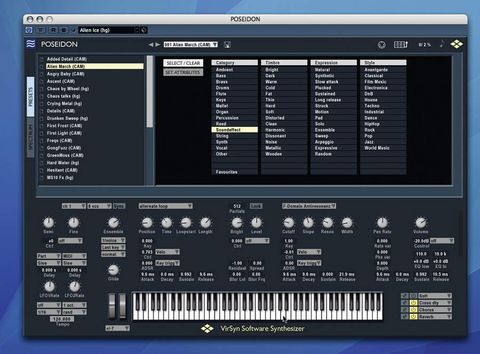It's difficult to catch a breath of fresh air in the software synth market - it's awash with sound-alike analogue clones and sample-based ROMplers.
The German developer VirSyn has always been a beacon of originality, though, offering jaded musicians more than just retro rehashes. VirSyn's new release goes by the name of Poseidon and, like several of the company's previous synths, is designed for those who are seeking something a little bit different.
Overview
Like all VirSyn products, Poseidon is cross-platform and will operate as a standalone synthesizer or a plug-in (VST, RTAS and AU formats are supported). The instrument draws some of its power from Cube, VirSyn's additive monster, though it's not simply a product of trickle-down technology.
Poseidon's oscillator is clearly its beating heart and is based on VirSyn's existing additive technology. Things start with the spectral analysis of a sampled sound, and this is then broken into partials. There can be as few as one partial, or as many as 512. The more partials you use, the more accurately the sound is reproduced.
You're given a significant amount of control over how the sound is played back over time. You can determine the playback's start position in the spectrum, the length of the sound to be played and how fast the spectrum will be scanned during playback.
You can even apply a dedicated ADSR envelope to the scanning position - it's heady stuff. Owners of Roland's V-Synth might be finding some of this very familiar, and Poseidon can indeed sound similar to that particular instrument. However, the similarities extend no further than the way in which samples are handled.
As with VirSyn's Cube, Poseidon enables you to resynthesize your own samples. This opens up new possibilities, and VirSyn have included a number of features that let you fully explore them. You can analyse both WAV and AIFF files, and you can indicate whether the source sound should be seen as a Complex or Harmonic source.
The former is fine in most cases, though the latter can work better when you're dealing with clean, musical tones. Naturally, you can also assign a root key, though Poseidon will make an effort to determine the pitch itself.
A brand new filter
Intriguingly, Poseidon includes a brand new filter design. The F-Domain filter is unusual in that it doesn't specifically emulate the classic analogue-style filters you'll find on other instruments.
There are high- and low-pass modes, each with resonance, and these are accompanied by a pair of comb filters and the F-Domain Antiresonance filter. Unlike the other filters, the latter is completely different to anything we've seen before, combining a traditional resonant peak with a resonance notch near the cutoff frequency.
The sound isn't a far cry from that of the low-pass filter, but it is a genuine and useful alternative. All of the filter modes offer a fully adjustable response slope. That means you're not limited to a choice of, say, 12dB and 24dB. Instead, you can dial up any slope between 0.00 and 72.00dB. Cool.
Again, the filter has a standard ADSR envelope generator attached, and the same is true of the amp stage. These modulation sources are joined by a pair of LFOs; unusually, these are adjusted using solely numerical values rather than knobs.
You don't have to enter them manually, mind you - they can be dragged over with the mouse. That said, we have to confess that we felt more comfortable assigning them to the knobs on our MIDI controller - this can be done using VirSyn's effective MIDI Learn ability.
We should also mention Poseidon's Spatializer. This can pan the individual partials around the stereo sound field with up to - wait for it - 512 LFOs, allowing you to add motion to patches.
Poseidon also sports a selection of expected effects processors (the usual distortion, delay, reverb and choruses). Other familiar faces include VirSyn's Slot Machine for generating random patches, and a patch browser.
We like Poseidon. It takes guts to do something different, and we have to applaud VirSyn for taking us down a less-travelled synthesis path.
We'll admit we weren't knocked out by the included presets; they're not bad (there are some slick digital pads and a punchy drum or two) but they don't fully demonstrate the instrument's most interesting possibilities.
Fortunately, though, it's a cinch to whip up your own sounds, and Poseidon's resynthesis tools yield encouraging and inspiring results. The synth also benefits from a simple and uncluttered interface that makes it easy to learn and intuitive to use.
So, although it isn't for everybody (if you just need a squelchy bassline, you'll be better off with something else), Poseidon goes down as another solid VirSyn release.


